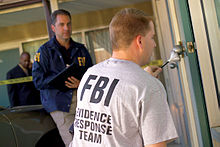Crime Scene Investigation
As Crime Scene Investigation (short CSI ) refers to the US and Canadian forensics . The term CSU (Crime Scene Unit) is also used.
Jurisdiction
The CSI is responsible for investigating crime scenes . This not only includes homicides, but also more harmless things like burglary or theft . The CSI investigators take photos of the crime scene or look for traces such as fingerprints and blood. They make sketches and try to reconstruct the sequence of events on the basis of such forensic evidence (including with modern computer programs). CSI investigators can also testify in court to present their investigation results.
construction
The structure of the CSI varies depending on the state and city. Sometimes the unit consists of specially trained police officers, but there are also civil crime scene investigators. Both types are subject to a supervisor, who does not have to be a police officer, but can also be civil. The individual teams are in turn subordinate to a so-called commanding officer .
Some federal agencies such as the FBI or NCIS have their own crime scene investigators. These units are then no longer referred to as the Crime Scene Unit or Crime Scene Investigation Teams. In the FBI, for example, the unit is called the Evidence Response Team Unit . The FBI or NCIS crime scene investigators only investigate capital and federal crimes.
CSI in the media
CSI teams became known through television series such as CSI: Miami , CSI: New York or CSI: Las Vegas . However, these hardly correspond to reality. Only the areas of responsibility of the fictitious Crime Scene Investigator are irrational. Not only do they investigate the crime scene, but they also work in all other areas of the crime lab. The crime scene investigators compare fingerprints, perform DNA analysis or examine ballistic evidence. Nor does the CSI interrogate suspects or conduct the investigation.
